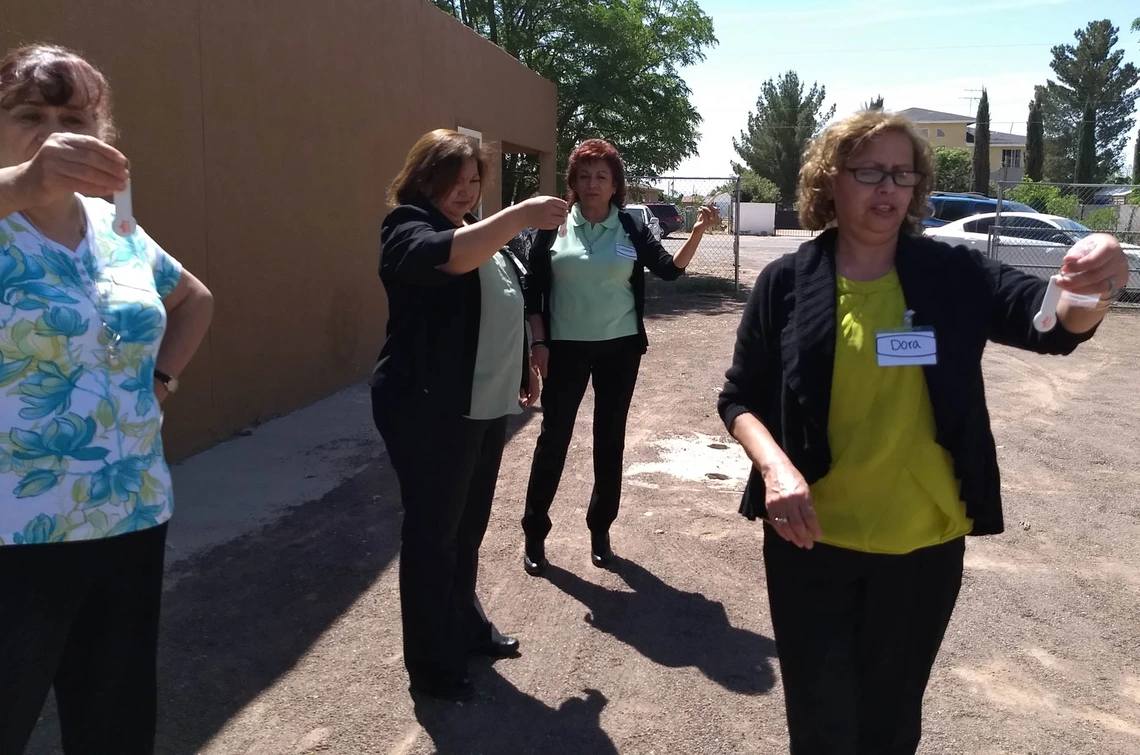Border Communities Deal with Heat-Related Risks

Extreme heat is a risk to public health, especially in cities along the U.S.-Mexico border. The risk of heat-related illnesses and deaths increases when vulnerable frontline communities lack attention and access to resources. In July 2017, AYUDA, a community environmental health organization which advocates for low-income residents, Paso del Norte Red de Promotoras, a community health workers coalition, and UA School of Natural Resources and the Environment’s Associate Professor Gregg Garfin convened a team of researchers, and community development and health practitioners to empower people in El Paso del Norte Region, including the cities of El Paso, Texas, Ciudad Juárez, Chihuahua, and Las Cruces, New Mexico to reduce heat-related risks through improved communication and preparedness. This bi-national partnership builds upon previous collaboration between federal, state, and local governments on urban risk assessment including the University of Texas at El Paso, Universidad Autónoma de Ciudad Juárez, Colegio de la Frontera Norte, and the City of Las Cruces. This two-year seed project funded by the Haury Program helped increase public understanding and capacity for addressing public health risks related to exposure to extreme heat and improve knowledge and skills among community health workers for identifying heat-related health risks. In this regard, the project has broken new ground in environmental justice in El Paso.
Expectant mothers are seldom mentioned as a population that is vulnerable to extreme heat, and the project spotlighted the heat-health risks to expectant mothers in the region, empowered maternal health workers with information to prepare this at-risk population. The project team developed a four-pronged approach for addressing heat-health risks: (1) learn about relevant concerns, capacities, and needs through discussions with community development and maternal health practitioners in El Paso; (2) develop a novel detailed bilingual curriculum for health workers that addresses heat-related health risks for border residents and expectant mothers, (3) implement health worker trainings, one-on-one discussions with community members, survey data gathering, and low-cost home heat-reduction projects, and (4) exchange knowledge with initiatives in other border communities.
 The team shared maternal heat-health risk knowledge with communities across the U.S. and is taking a first step toward the development of a collaborative learning network to exchange knowledge and best practices that has the potential to transform the abilities of the U.S. and Mexico to reduce illnesses and deaths. Through outreach to other border communities working on heat health risk, e.g., Yuma County in Arizona, partners, these new partnerships help increase interest in the effects of heat exposure on expectant mothers in organizations aiming to address heat-related risks.
The team shared maternal heat-health risk knowledge with communities across the U.S. and is taking a first step toward the development of a collaborative learning network to exchange knowledge and best practices that has the potential to transform the abilities of the U.S. and Mexico to reduce illnesses and deaths. Through outreach to other border communities working on heat health risk, e.g., Yuma County in Arizona, partners, these new partnerships help increase interest in the effects of heat exposure on expectant mothers in organizations aiming to address heat-related risks.
The curriculum addressing heat-related health risks was certified by the states of Texas and New Mexico. Through a train-the-trainer program, the project team trained approximately 40 community and maternal health workers at the Red de Promotoras. AYUDA and Red de Promotoras del Norte staff interacted with approximately 265 members of the public residents, most of whom indicated, through interviews and surveys, that they lacked straightforward information on how to prepare for and respond to heat emergencies that can affect the health of their families, neighbors, or unborn children. Evaluation of the training and interview responses demonstrated increased awareness of human health risks of extreme heat, how to protect family from heat risks, and how to use passive cooling techniques to reduce home exposure to extreme heat.
Bernadette "Bernie" Carrillo, an El Paso Red de Promotoras doula, said participating in the Hot Spots for Health Resilience gave her the idea of creating a community-based organization called EP Doula Collective. “Three other doulas and I saw a great need for accessible, affordable and inclusive education for families in our area. From this concern, we began EP Doula Collective!”, Bernie said. Her organization strives to provide free community education courses for all families, regardless of their ethnicity, socioeconomic status, religion or sexual orientation. “The first series of classes covered topics such as childbirth education, postpartum mood disorders, informed consent/choosing a provider and proper car seat installation. We taught most classes, but also had guest presenters join us, such as a licensed clinical social worker and a child passenger safety technician” added Bernie. Bernie said her team worked tirelessly leading up to the launch of their collective. “Working alongside the Hot Spots project team taught me the importance of community-based organizations. Through this experience, I saw firsthand how the work from the Hot Spots project impacted my community, and increased awareness of heat risk, and have been forever changed. This project created a safe and inclusive community for all families and helped lay the foundation for many projects to come” said Bernie.
“Linking arms with wonderful partners and learning about the tangible differences that they are making in the lives of people in their communities has me hopped up to expand upon our work to marry academic research with environmental justice”, said Gregg Garfin, Hot Spots project’s lead.
Listen to a podcast where Dr. Gregg Garfin, UA Associate Professor, Rachel Curtis, labor doula, and certified lactation counselor, and Esther Olivares, Red de Promotoras del Paso del Norte, talk about how they got involved in the project. Also, you can learn more about the project in the January 2018 issue of the Southern Climate Monitor.
More information about this and other project funded by the Haury Program here.
